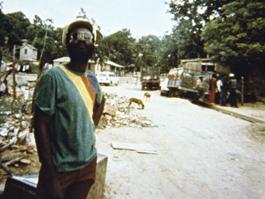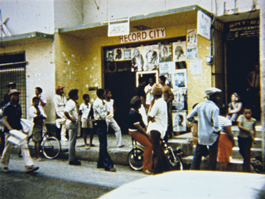|
No other country of the south has evolved, but also altered
its music in the last 30 years to the same extent as Jamaica.
This film portrays the genesis of Reggae music, which has
its origins in the deportation of many Africans as slaves
to the British colony of Jamaica. The development of Reggae
reflected the struggle against racist oppression and exploitation,
which after the victory over the colonial powers in 1962,
directed itself against the destruction caused and left behind
by the former government.
In the 1950's, the Jamaican seasonal workers returned from
the southern States of America, bringing the first transistor
radios and records, and with them Rythm & Blues to their home
country. The new music was transmitted directly by radio from
Florida to the towns and villages of Jamaica, where the traditional
Caribbean music, the Mento, and the Calypso with its African
rythm, were at home.
Musicians began to combine elements of Rythm and Blues with
traditional Jamaican music and the African rythm. Results
of their experiments were Ska, then Rock-Steady and finally
in the late 60's, Reggae.

Radio and records have introduced a new chapter to Jamaican
music, as Reggae would no longer be conceivable without recording
studios and records. A few years ago the D.J.'s travelled
around the country with their mobile "Sound Systems" and played
the latest records from the USA and later from the Jamaican
studios at the local dances. Today you can find record shops
everywhere in Jamaica, where the latest hits recorded in Kingston
are played. The music throbs from huge loudspeakers on the
streets. Here the young people listen and dance to the music,
some of them all day long, as only a minority have a chance
of finding work. They explain why they love Reggae. A young
musician from the ghetto explains the connection between Reggae
and ghetto life and the meaning of Rastafari to him. A group
practises their new song, hoping they will soon get the chance
to record in one of Kington's studios.

|
Credits
| Director |
|
Rolf Coulanges
|
| Cinematographer |
|
Rolf Coulanges bvk |
| Writer and Editor |
|
Ursula Dieterich |
| Narrator |
|
Donnie
McDermott |
Original version
English/Creole with English subtitles
Production
German Film- and Television Academy, Berlin (dffb) &
Rolf Coulanges
Distribution
amber film Berlin
© amber film Berlin, 1981
|
|